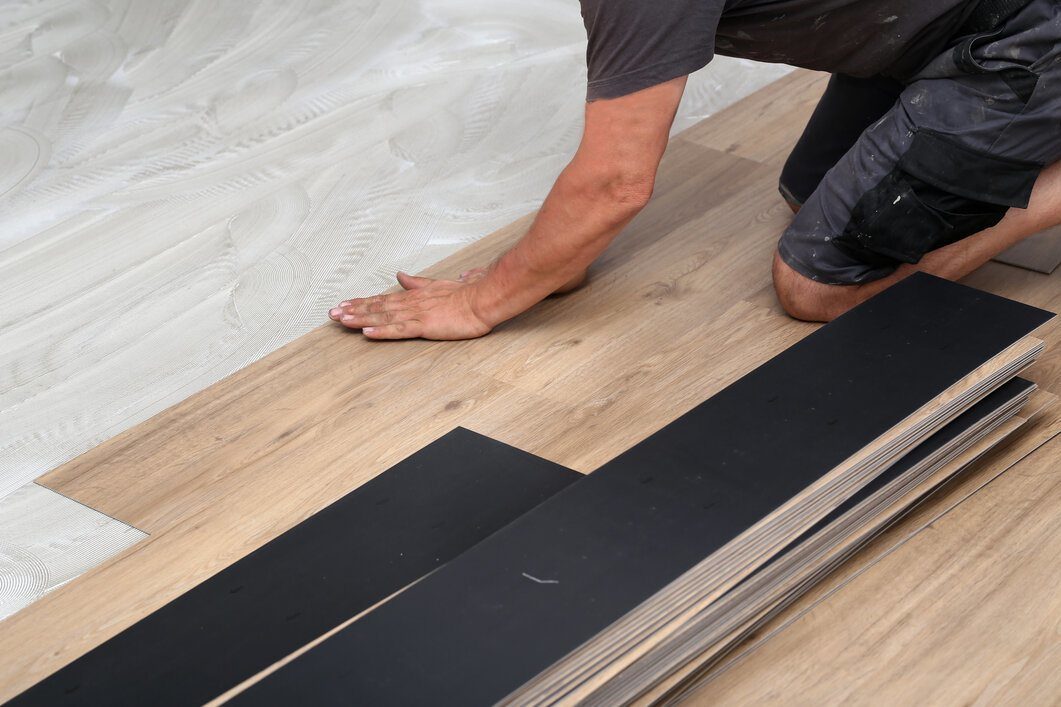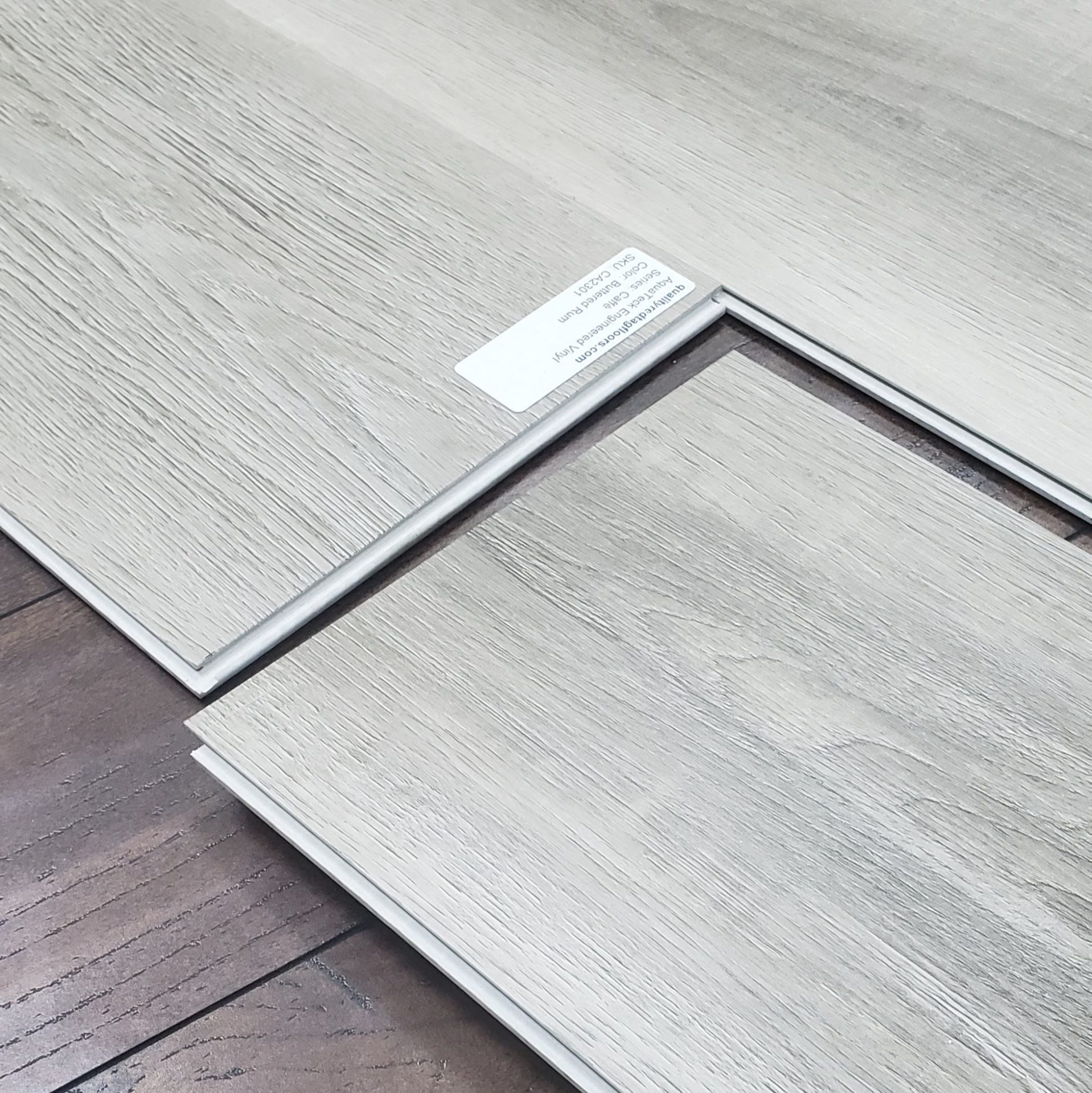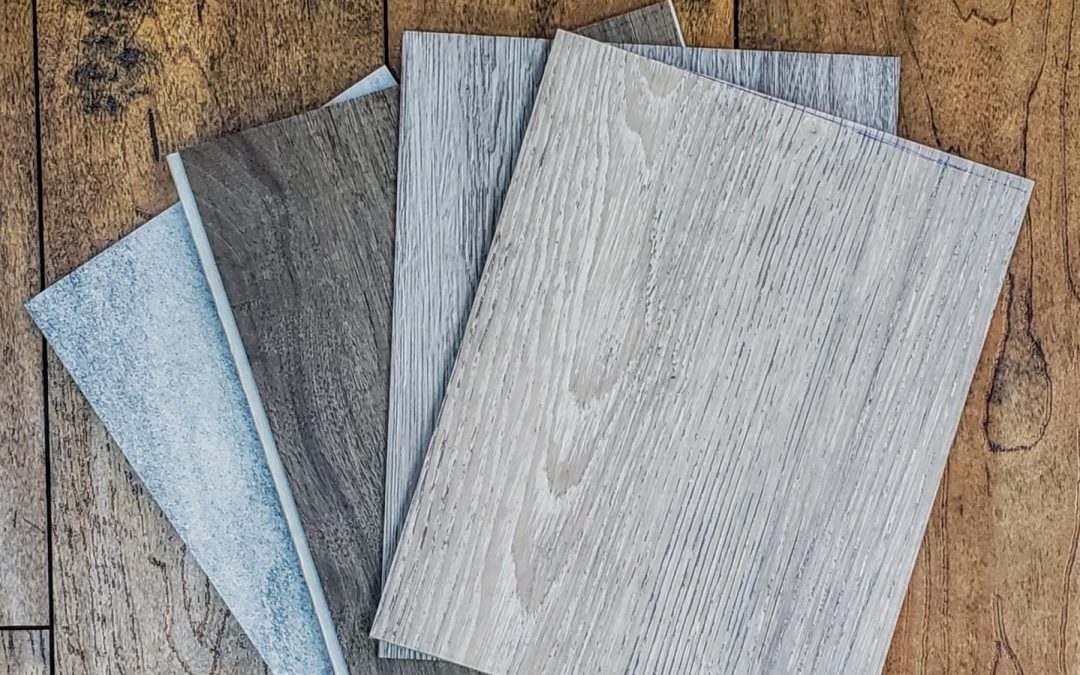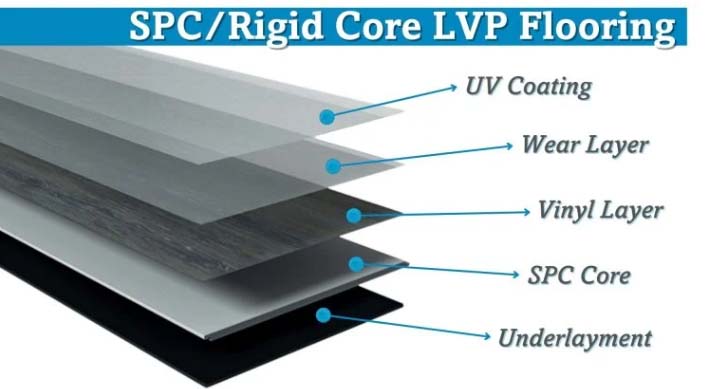When choosing vinyl plank for your home or office, shopping can get overwhelming quickly. With dozens of different styles and choices of flooring, its hard to answer the question: Is this the right vinyl flooring for my home?
This article is written to make these choices a little less overwhelming. Read through this entire blog, and things will start to be come more clear.
Types of vinyl flooring
To figure out the pros and cons we first need to establish the different types of vinyl flooring. There are many different types of vinyl flooring available, but the easiest way to think of vinyl plank flooring is in two categories. Glue down and click.
What is glue down vinyl flooring?

Example of glue down flooring
Glue down vinyl flooring is all in the name. It’s vinyl plank that is specially designed to be glued down as the primary installation method. There are different types of glue down vinyl flooring products available at all different thicknesses. The two main types are glue down only, and loose lay vinyl.
Loose lay is thicker and easier to install. If you are a beginner this is the perfect floor, as installation does not get any easier.
Glue down only is thinner and must be entirely glued down in all locations. If you require a more budget sensitive floor, glue down only tends to be on the lower end of pricing for vinyl flooring.
Glue down only products:
Thickness: 2 – 3mm
Wear layer: 6 – 20mil
Install location: Above, On, Or Below Grade
Glue down or loose lay:
Thickness: 5mm
Wear layer: 6 – 20mil
Install location: Above, On, Or Below Grade
Pros and cons of glue down only
Let’s explore the pros and cons of the thinner option first.
Pros of glue down only:
-inexpensive
-relatively easy to work with
-easy to mould, shape on uneven locations
-easy to mould into stair nosing, or to wrap existing stair nose
-durable
-waterproof
Cons of glue down only:
-not very comfortable (thin)
-doesn’t have great sound reduction
-cold to walk on over concrete (poor insulation)
-telegraphs to the floor and shows flooring imperfections easily
-more prone to lifting in areas of sunlight exposure
Pros and cons of loose lay vinyl
Loose lay tends to be more robust, but what are main pros and cons?
Pros of loose lay vinyl
-waterproof
-extremely easy to work with
-more comfortable to walk on (thicker)
-easy to mould and shape in uneven locations
-more installation methods are possible leave options
-fastest installation out of all types of flooring
-loose lay install method allows for easy replacement of planks
-great durability
-install with or without taking baseboards off
-warmer to walk on, as product has insulation layers
-little to none when it comes to expansion and contraction
Cons of loose lay vinyl
-typically costs more than thinner options
-limited texture options
-telegraphs to the floor, leveling in uneven areas is required
-can be cool to the foot when installed directly over concrete
What is click vinyl flooring?

Example of vinyl click flooring
Click vinyl is quickly becoming the most popular installation method for DIY’ers and professionals. Click offers many different style options and price ranges. Click vinyl is a vinyl flooring product that is often referred to with many different terms. To fully understand click vinyl and what it is, you need know that there are many different types of vinyl click flooring. Here is a short list of the main ones:
-SPC (Stone polymer composite) Engineered Vinyl Plank
-WPC (Wood polymer composite) Engineered Vinyl Plank
-Click vinyl (traditional)
Click vinyl has improved over the years from its traditional state. Before SPC and WPC options were available, click vinyl had a poor reputation for separation and warping in sunlight areas. (Click vinyl – traditional) This is due to the core of the material being made with only plastics opposed to a composite product. Composite products offer better stability, and stronger joints.
There are not many traditional click vinyl products on the market anymore, and if one does come across them, we recommend avoiding this product for installation on the main floor. In areas like the basement, successful install is possible.
What is SPC vinyl flooring:
SPC is the most recent and updated style of click vinyl flooring.
SPC flooring is a composite product made with a mix of plastic and stone. The stone that is mixed into the core is typically a limestone powder, but the stone type may vary. The key take away is that this provides extreme resilience to temperature change and provides a stronger locking mechanism for the joints. With stronger joints, comes less separation.
Be aware when purchasing thinner SPC, as the stone core while still durable, is more brittle the thinner you go with the product. We recommend a minimum of 5mm and prefer the 6.5mm thickness of SPC flooring.
SPC is often referred to as Luxury Vinyl Plank or Engineered vinyl plank, so don’t be confused if you hear lots of terms describing the same thing.
SPC is comprised of 4 layers:
-Wear Layer
-Print Layer
-Core layer
-Underlayment
SPC Vinyl Flooring
Thickness: 4mm – 8mm (Includes backing)
Wear Layer: 6mil – 20mil
Install location: On, above, or below grade
Pros and cons of SPC Vinyl Flooring
SPC vinyl flooring is the fastest growing part of the flooring industry. There is a high demand for SPC flooring, so there are a lot of products to choose from. Not all SPC is create equal. We recommend comparing thickness and wear layers. Hold the product in your hand (a whole plank if possible) to feel the difference in rigidity between the different thicknesses of SPC vinyl flooring. While durable, SPC does have some drawbacks and limitations for installation. View below:
Pros of SPC vinyl flooring
-water proof
-durable
-easy install
-score and snap planks to cut
-strong locking system
-extreme impact resistance
-great sound reduction
-wide selection of textures and styles
Cons of SPC vinyl flooring
-requires extremely level flooring for successful install
-gapping and breakage could occur if floor is not properly leveled prior to install
-harder core is less comfortable to walk on
-can feel cool to the foot
-thinner SPC tends to be brittle, causing breakage and higher waste during install
What is WPC vinyl flooring?
WPC vinyl flooring is a composite product traditionally made with a mix of wood and plastic. The wood acts as a stabilizer just like the stone in the SPC. WPC was the first advancement on traditional click vinyl. With a vinyl layer attached to a Wood Plastic Core, a thicker more comfortable product was achieved.
WPC is typically thicker than SPC, however, it is made at lower densities. WPC should only be compared thickness wise to other WPC’s. The lower density of this product means that it is slightly less ridged than SPC. WPC usually comes in wider and longer formats than SPC and offers more textured styles and options. Most WPC will have better cosmetics than SPC, but with recent improvements, this is not always the case. Be sure to ask your sales representative about the different textures and sizes available.
WPC is comprised of 5 layers:
-wear layer
-print layer
-vinyl layer
-WPC core
-cork or underlayment backing
WPC Vinyl Flooring
Thickness: 8mm (Includes backing)
Wear Layer: 12mil – 20mil
Install location: On, above, or below grade
Pros and cons of WPC Vinyl Flooring
WPC has been around longer than SPC and is a proven product. While WPC is thicker than SPC and provides more comfort, its not as durable in some respects.
WPC is less impact resistant and can be brittle and/or soft on the joints. WPC is slightly more forgiving under stress for low/ high points as it moulds to the floor better than SPC. See below:
Pros of WPC vinyl flooring
-water proof
-durable
-easy install
-score and snap planks to cut
-great sound reduction
-premium textured styles available, matching texture to print (EIR finish)
-thicker
-super wide, and long planks available
-warm to walk on
-softer core, more comfortable to walk on
Cons of WPC vinyl flooring
-less impact resistant
-edges can be brittle or soft, causing easy breakage during install
Conclusion:
Thank you for reading!
With all the options available on the market, shopping can be confusing. Be sure to refer to this article often, and soon the different types of flooring will make sense. The goal is to make an informed decision and to be confident in your purchase.
For advice or questions, please contact our sales team at 780-721-4324!






Recent Comments